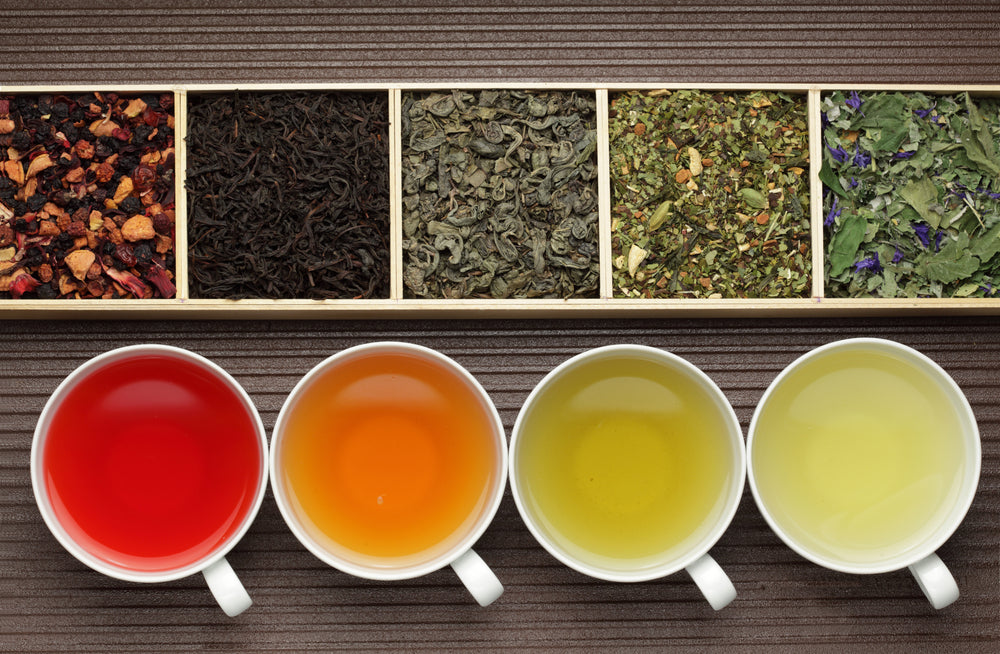Add description, images, menus and links to your mega menu
A column with no settings can be used as a spacer
Link to your collections, sales and even external links
Add up to five columns
Add description, images, menus and links to your mega menu
A column with no settings can be used as a spacer
Link to your collections, sales and even external links
Add up to five columns

The Ultimate Guide to Fruity and Non-Fruity Teas
July 02, 2023 3 min read
The Ultimate Guide to Fruity and Non-Fruity Teas
Tea is a versatile beverage that offers a wide range of flavors and aromas, making it a delightful experience for tea enthusiasts. Among the various tea options available, fruity and non-fruity teas are two broad categories that often captivate beginners. These teas are characterized by their distinct flavor profiles, with fruity teas offering vibrant and refreshing notes, while non-fruity teas encompass a diverse range of flavors that are not fruit-centric. In this comprehensive guide, we will explore the nuances of fruity and non-fruity teas, offering beginners a gateway to the diverse world of tea.
Understanding Fruity Teas
Definition and Characteristics of Fruity Teas
Fruity teas are teas that are made with fruits, flowers, or other botanicals that impart a fruity flavor. They can be either caffeine-containing or caffeine-free. Fruity teas are often enjoyed for their refreshing and invigorating qualities. They can also be enjoyed for their health benefits, as many fruits and botanicals are known to have antioxidant and anti-inflammatory properties.
Fruits and Botanicals Used in Fruity Teas
A wide variety of fruits and botanicals can be used to make fruity teas. Some of the most common fruits used in fruity teas include:
- Citrus fruits: oranges, lemons, grapefruits, limes
- Berry fruits: strawberries, raspberries, blueberries, blackberries, cranberries
- Stone fruits: peaches, plums, apricots, cherries
- Exotic fruits: mangoes, pineapples, passion fruits, guavas, lychees
- Other fruits: apples, pears, melons, grapes
In addition to fruits, a variety of botanicals can also be used to make fruity teas. Some of the most common botanicals used in fruity teas include:
- Hibiscus
- Rosehips
- Chamomile
- Lavender
- Jasmine
- Mint
- Ginger
- Turmeric
Types of Fruity Teas
There are three main types of fruity teas:
- Fruit-infused teas: These teas are made by infusing tea leaves with fresh or dried fruits. The fruits are typically added to the teapot before the water is added, and the tea is then steeped for a few minutes.
- Fruit-flavored teas: These teas are made by adding fruit extracts or essences to tea leaves. The fruit extracts or essences are typically added to the teapot after the water has been added, and the tea is then steeped for a few minutes.
- Herbal fruit teas: These teas are made by combining fruits with other herbs or botanicals. The fruits and herbs are typically added to the teapot together, and the tea is then steeped for a few minutes.
Brewing and Enjoying Fruity Teas
Fruity teas can be brewed using the same methods as other types of teas. However, it is important to note that fruity teas may require a shorter steeping time than other types of teas. The optimal steeping time for a fruity tea will vary depending on the type of fruit used and the desired strength of the tea.
Fruity teas can be enjoyed hot or cold. They can also be enjoyed plain or with added sweetener or milk. Some popular ways to enjoy fruity teas include:
- Drinking them hot as a refreshing afternoon pick-me-up
- Adding them to ice cubes for a cool and refreshing summer drink
- Blending them with other fruits and juices for a healthy smoothie
- Infusing them into desserts or baked goods for a delicious and unique flavor
Exploring Non-Fruity Teas
The Diversity of Non-Fruity Tea Flavors
Non-fruity teas encompass a wide range of flavors, from the delicate and floral notes of jasmine tea to the bold and robust flavors of black tea. Some of the most common non-fruity tea flavors include:
- Floral: jasmine, lavender, rose
- Earthy: pu-erh, yerba mate, dandelion root
- Spicy: chai, cinnamon, ginger
- Nutty: almond, hazelnut, chestnut
- Woody: oolong, black tea, aged teas
Single-Origin Teas
Single-origin teas are made from the leaves of a single tea plant. This means that the flavor of the tea is determined by the specific region where the tea plant was grown, as well as the time of year it was harvested. Some of the most popular single-origin teas include:
- Green tea: sencha, matcha, dragon well
- Black tea: Assam, Darjeeling, Ceylon
Subscribe
Sign up to get the latest on sales, new releases and more …
